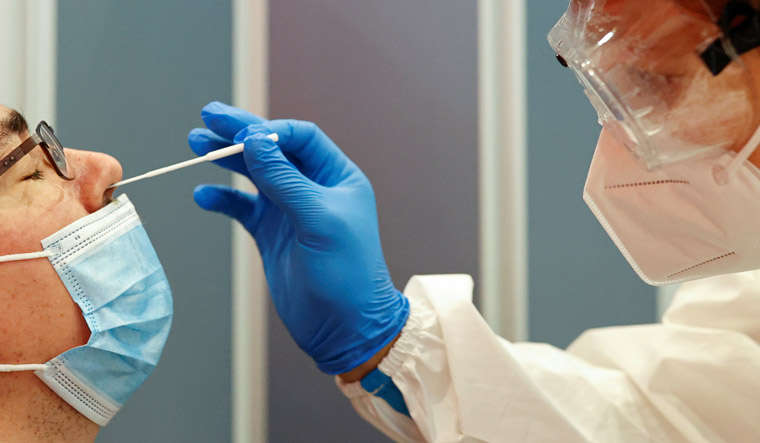Close to 30 per cent people, or about 58 lakh people in Delhi, had developed antibodies against SARS-CoV-2 infection, results of the second sero survey conducted by the Delhi government in 11 districts suggest.
The previous survey, conducted by the National Centre for Disease Control and Delhi government in early July, had revealed that 22.86 per cent people had antibodies, and the latest survey suggests 28.35 per cent of people developed the same. Among various districts that were studied, the increase in the number of people with antibodies was the highest (50 per cent) in south-east Delhi that includes defence colony, Sarita Vihar and Kalkaji. Overall, the range of increase was around 6 to 50 per cent; south Delhi reported 46 per cent increase, while north-east reported only a 6 per cent increase. The sample size was smaller this time round—15,000 people—than the last round where the sample size was around 22,000 people.
"The government of National Capital Territory of Delhi had commissioned a follow-up sero survey for evaluation of the prevalence and trends of the SARS-CoV-2 infection in the general population of Delhi. The sero survey applied a repeated cross-sectional study design, and the first round was conducted in the first week of August 2020. The other two rounds are scheduled in the first weeks of September and October 2020. The survey was planned by the Government of NCT Delhi with technical support of Maulana Azad Medical College (MAMC), New Delhi," the Delhi government said in a statement.
Samples were drawn from within the communities of the catchment area of the Delhi government dispensaries and primary urban health facilities through a team of local frontline health workers. More women (32.2) were found to have developed antibodies as opposed to men (28.3)—a trend that has been seen in the Mumbai sero survey as well.
The results indicate that a large population of Delhi (about 70 per cent) still remain susceptible to the infection.
A top health ministry official involved in sero surveys conducted by the central government had told THE WEEK on an earlier occasion that questions on longevity of the antibodies to immune responses were still not being understood fully. “If you ask me today about H1N1, I can say many things. But this virus is too new for us to make these assessments,” the official, also an expert in infectious diseases, said, speaking on the condition of anonymity.
Sero surveys, he said, were done to gauge the true spread of infection by measuring the IgG antibodies (as opposed to IgM) that developed in an individual. IgM antibodies may also be present in the acute phase, though. These surveys did not indicate whether an individual had developed immunity to the virus, it merely indicated that they had been exposed to the infection.
“In my view, the only way to tire the virus out is by taking all necessary precautions. If everyone wears a mask, the virus will be unable to find a host, and eventually its virulence would come down. However, it may take a full year to get a better understanding on the behaviour of virus, immune response, protection (including approximate duration of protection by antibodies), outbreak potential after initial containment etc. Till that time, wearing masks, physical distancing and sanitisation will have a significant role," the expert said.
“While conducting sero surveys was an important exercise, they are also an expensive, resource intensive one, and areas (cities) for the survey must be selected on the basis of epidemiological intelligence,” he said. An ICMR survey done earlier in May found that under one per cent of infections existed around the country at that time, and hence, it served no epidemiological purpose. Similarly, in Delhi, the official said it would have made far more sense to wait a little longer before launching the second survey. "Any casualness and complacency will lead to variations in daily numbers as a large population is still susceptible, particularly in the vulnerable category,who have been under protective cover of these measures until now," the expert said.
It may be recalled that the previous Delhi sero survey conducted by the NCDC and the Delhi government had been criticised by a small section of scientists in media reports. However, NCDC officials told THE WEEK that the criticism was baseless and scientifically invalid. "The criticism around the high number of people with antibodies versus the comparatively low numbers of RT-PCR detected infections ignores the very basis of epidemiological principles. IgG antibodies develop around 14 days after the possible exposure of an individual to virus infection.” Hence, the seroprevalence detected during 27 June-July 5, corresponds to possible exposure during June 13-June 22. The latest sero survey corresponds to exposure in mid-July.
"Worldwide, community based sero surveys are used to estimate the extent of exposure/transmission in the community and seroprevalence always exceeds the number of infection detected by standard diagnostic tests utilised in routine health care settings. No community surveillance can detect 100 per cent cases. Hence, the wide difference. This has also been the case with the ICMR sero survey, where the prevalence indicated 1:126 case infection ratio," officials involved in the survey said.
The phenomenon of IgG positivity in COVID negative (RT PCR) persons, and the absence of IgG or antibody response in COVID positive (RT-PCR) or any other tests, was also something that was found in the first round of the Delhi survey, and had been documented in other countries as well.
On the issue of the reported higher seroprevalence among females and children, the officials said that was "an objective laboratory-based finding and not a subjective estimate". "The inter-district variation in estimates of seroprevalence in the results could be because of the difference in population density of different districts, and nature of contagiousness of the disease," they said.
"The host immune response in COVID-19 is still being studied and transient nature of humoral response (immunity based on serum antibodies produced by plasma cells) in SARS-CoV-2 is already documented in many articles," they added.



